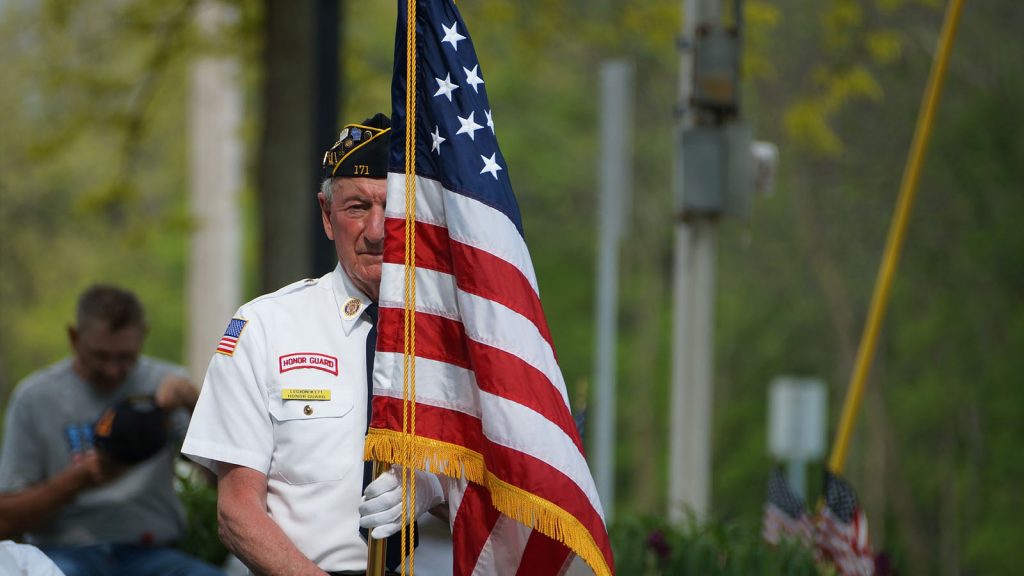A provision of the Michigan adult use marijuana law offers great potential to improve veteran health and further understanding of cannabis effectiveness as a medicine, with the Michigan initiative set to funnel $40 million to finance clinical trials of marijuana-based treatments for post-traumatic stress disorder (PTSD), opioid addiction, and suicide prevention in military veterans. “That research will save lives,” said former Marine Mark Carrillo, chief operating officer for the Sacramento, California-based veteran advocacy organization Weed For Warriors.
Carrillo said after returning to the U.S. in 2007 from two deployments in Fallujah, Iraq, he began drinking heavily to cope with his post-traumatic stress syndrome (PTSD).
“By the time the economy crashed and the recession cut job opportunities, I was drinking a fifth of vodka every day thinking that was okay. I got acute pancreatitis,” Carrillo told Weedmaps News. “But I started smoking weed again in 2009 and it changed my life. Cannabis helped me to overcome my fear of being in crowds, to let people walk behind me without anxiety. Cannabis really saved me.”
Carrillo told Weedmaps News that more research into cannabis effectiveness is needed to convince the U.S.’s law enforcement and medical communities of its benefits for veterans like him. Weed For Warriors, which helps more than 1,000 veterans access marijuana, operates 13 chapters nationally.
Sean Kiernan, who served in the U.S. Army Infantry and is the chief executive officer for Weed For Warriors, told Weedmaps News there is a dearth of funding to support medical cannabis research.
“Unfortunately, much of that research historically has been directed to exploring the negative effects of marijuana, while ignoring the therapeutic uses of it,” Kiernan said.
“Not only do I think it makes logical sense for the states legalizing marijuana to direct revenues from marijuana taxes to support research to improve the lives of veterans, but that research also has the potential to improve the lives of many others considering suicide or suffering from these conditions,” Kiernan said.
He predicted that scientific studies would validate the anecdotal experiences of thousands of vets using marijuana for medicinal purposes.
“Michigan voters should be applauded for doing this. Filling in the science will give the final push not only to legalize cannabis nationally, but to firmly establish its medicinal use,” he said. “For vets, cannabis is a substitute for deadly pharmaceuticals. So many vets are putting a joint in their mouth instead of a gun.”


Matt Schweich, deputy director of the Marijuana Policy Project (MPP) and the Michigan campaign for legalization, told Weedmaps News the law currently underwrites $20 million in research for two years.
“We feel it’s important to make the case for veteran access to medical marijuana,” Schweich said.
He said physician-researcher Dr. Suzanne Sisley helped MPP advocate for more research to explore the role of cannabis in veteran health issues.
“We’ve long been aware of Dr. Sisley’s work,” he said. “There was widespread support for clinical trials. We think this is going to produce some important academic research.”
Sisley, a practicing primary care physician and cannabis researcher in Scottsdale, Arizona, said it has been difficult obtaining funding to study the medicinal effectiveness of marijuana.
“The federal government historically has been unwilling to fund efficacy trials because the official line was cannabis was a public health threat ineffective in treating health or mental health conditions.”
Sisley, who has conducted studies on marijuana for Colorado, told Weedmaps News that the Michigan law could catapult the state to the forefront of innovative marijuana research.
The Michigan native and the president and principal investigator for the not-for-profit Scottsdale Research Institute said if awarded a clinical study grant, her only agenda would be to collect objective data and publish the findings in peer-reviewed medical journals.
“If our research shows that medical data doesn’t support the efficacy of cannabis, then we will publish that finding,” Sisley said. “We hope to submit a clinical trial proposal to look at smoked and vaporized flowers as the preferred delivery methods, not pills because that is the most common way veterans use cannabis.”
She said her institute may also submit a proposal to study the substitution of cannabis for prescription opioids to ease the addiction crisis.
Brian Kaskie, associate professor of health management and policy at the University of Iowa, told Weedmaps News he’s pleased that states are stepping in to conduct marijuana research in lieu of federal inaction.
Kaskie, whose research has explored cannabis use among older Americans and its potential for reducing opioid abuse and improving end-of-life care, applauded Michigan’s foresight in funding marijuana research. But he wishes the law’s funding parameters would not be limited to clinical trials.
He said the biomedically based research that the Michigan law prescribes displays “disciplinary chauvinism,” a bias that medicine, and by extension, physicians, are the best researchers and that clinical trials are the best and research models.
“When you put a fence around research and say it only can consist of clinical trials, you’re limiting so many studies that could be performed far less expensively using fewer people and exploring a whole different set of important questions,” Kaskie explained.
Kaskie said much of the research supported by the National Institutes of Health (NIH) considered marijuana a substance to be abused or misused and that many older Americans using it were “old hippies reliving their youth.”
“But our research proved that was not the truth. We wouldn’t have known this if the state of Colorado only chose to fund clinical trials,” he said. “While clinical trials are certainly important, we need other kinds of research just as much. I’m very cautious about saying that the medical community should take the research lead to the exclusion of all other researchers out there.”
Richard Doblin, a researcher exploring the therapeutic benefits of marijuana and psychedelic drugs, told Weedmaps News that the Michigan law offers “tremendous opportunities to make marijuana into an FDA-approved medicine. The funding is a game-changer in making marijuana a medicine offering wide accessibility at a low cost.”
Doblin, the founder and executive director of the not-for-profit Santa Cruz, California-based Multidisciplinary Association for Psychedelic Studies (MAPS), is conducting research with Sisley studying the therapeutic potential of four strengths of marijuana. The researchers intend to partner to study the effectiveness of smoking or vaping the cannabis flower, not a marijuana extract, oil or synthetic.
He lauded Michigan’s requirement that only not-for-profit companies, institutes, and academic research centers are eligible to conduct the clinical trials.
“There are a lot of for-profit companies interested in CBD (cannabidiol) and THC extracts as a way to turn marijuana into pills,” he said. “We’re opposed to that. Our goal is to study the marijuana flower as a medicine in its natural form as a low-cost alternative to opioids.”
Doblin said he believes cannabis can reduce veteran suicides.
“But even in the states where medical marijuana has been approved, there is no insurance coverage to help vets pay for it and there will be no coverage until the FDA approves its use,” he said. “That won’t happen without clinical trials. The Michigan law’s funding will be a tremendous public benefit.”















